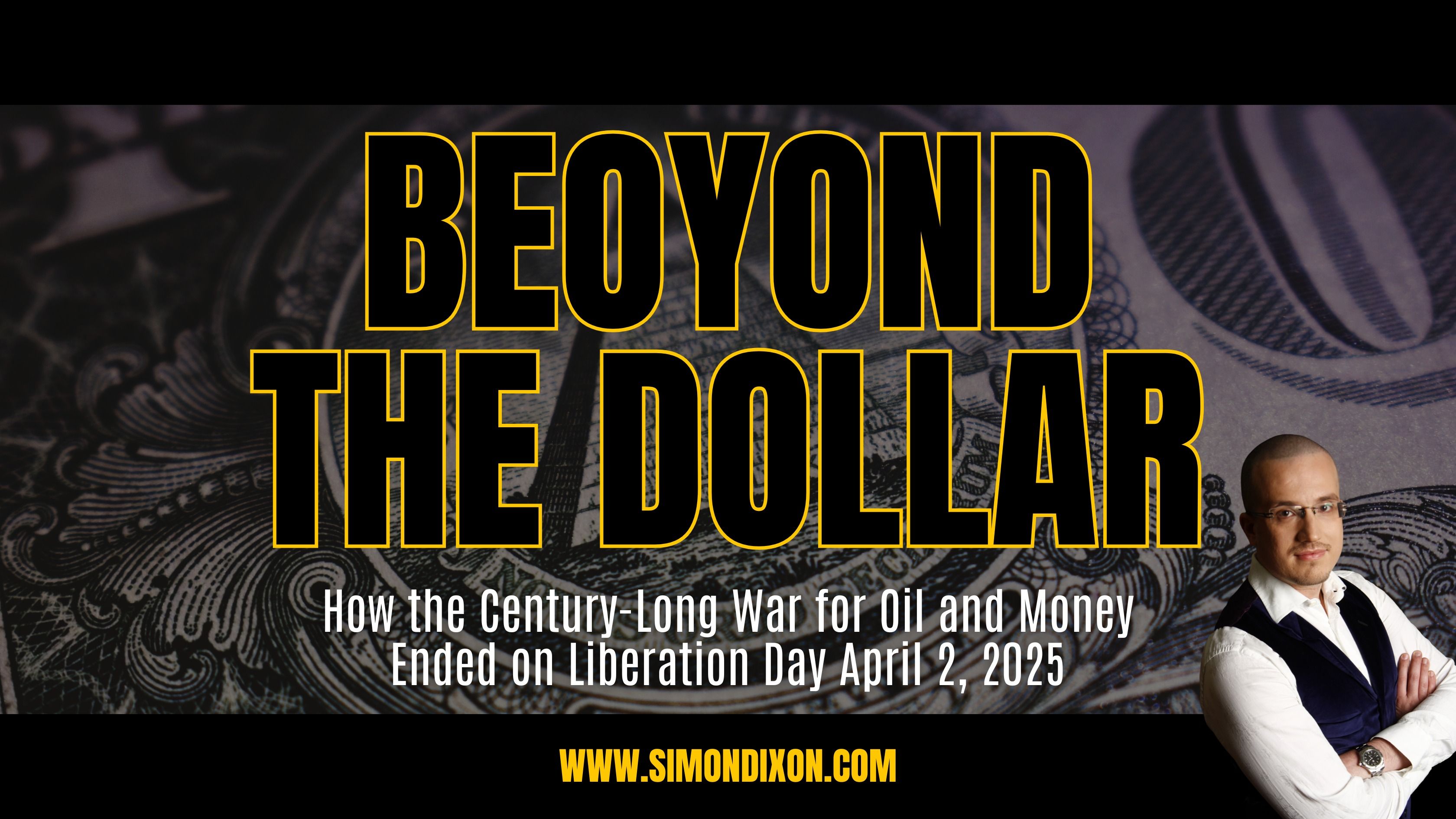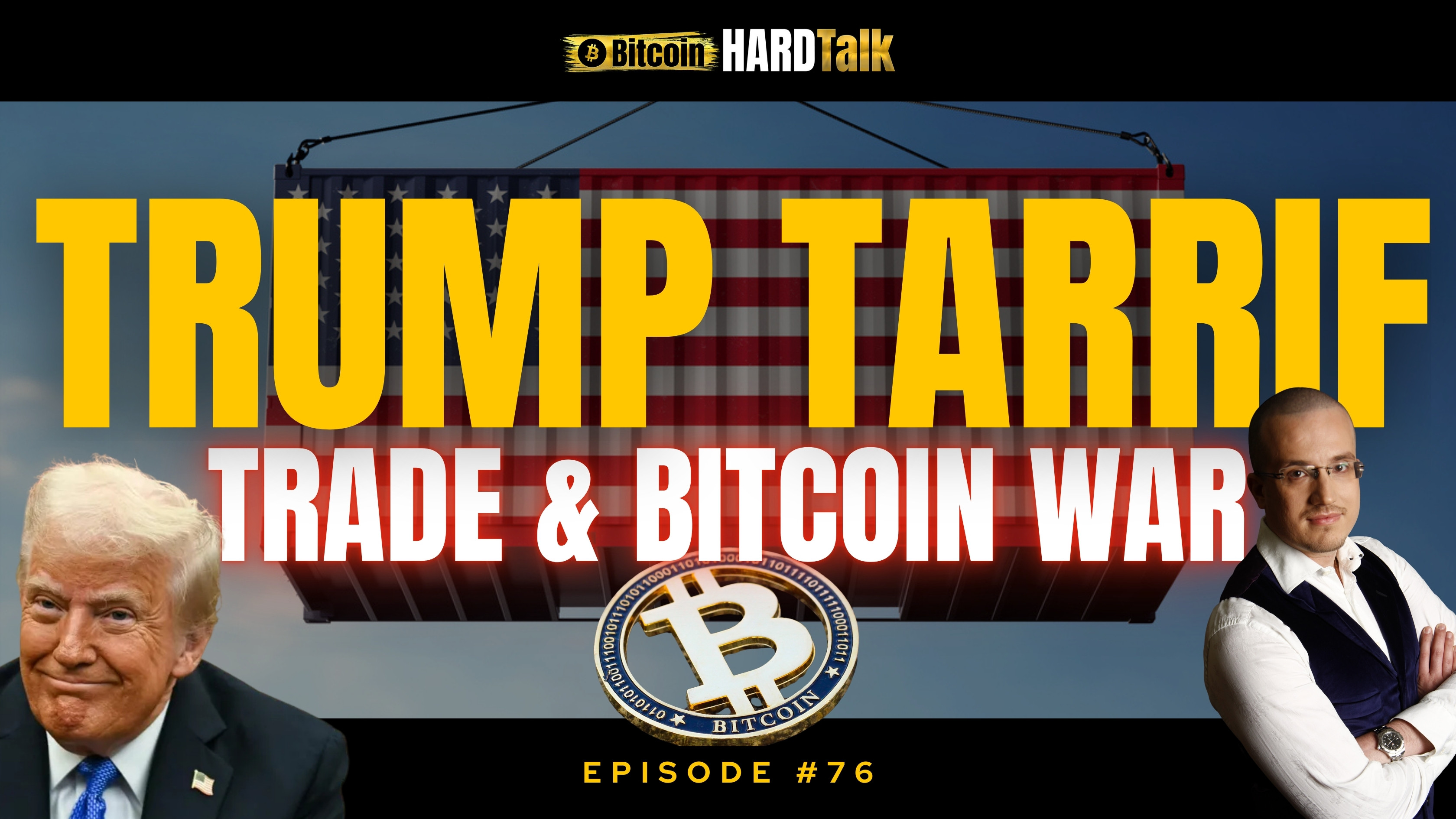🇺🇸 Beyond the Dollar: How the Century-Long War for Oil and Money Ended on Liberation Day April 2, 2025
Apr 29, 2025
By Simon Dixon | SimonDixon.com
Many Americans believe that Trump’s tariff wars marked the beginning of a new “America First” era — a bold campaign pitched to the American people as a way to level the playing field against nations “ripping off” the U.S. economy.
But I make a different case.
April 2, 2025 — Liberation Day — was not a beginning. It was an end. It marked America’s hidden strategic retreat after losing a third world war — not one fought with bombs, but with dollars. The war was waged covertly through oil, covert wars, and financial terrorism.
And the U.S. admitted defeat on April 2nd 2025.
The first chapter of that global war began long before Trump ever entered politics. It began in 1917…
In 1917, the Bolshevik Revolution in Russia and Balfour Declaration in Palestine didn’t just transform one country — it changed the fate of the entire world economy.
By nationalizing the oil fields of Baku, the Bolsheviks shattered the early dreams of Western corporations like Royal Dutch Shell, the Nobel Brothers, and the Rothschilds, who had seen Russia as the heart of global energy wealth.
In response, oil corporations and Western governments pivoted aggressively to the Middle East — forging secret cartels, staging coups, and constructing a century of dominance through control of energy and money.
The original pivot was formalized with the Balfour Declaration—a public statement issued by the British government on 2 November 1917, during World War I.
It expressed support for the establishment of a “national home for the Jewish people” in Palestine, then an Ottoman territory with a small Jewish minority.
The declaration came in the form of a letter from Foreign Secretary Arthur Balfour to Lord Rothschild, a prominent figure in the British Jewish community, intended for the Zionist Federation of Great Britain and Ireland.
After these two historical events, an oil empire was built by the infamous “Seven Sisters” — the Western oil giants that dictated prices, controlled governments, and shaped wars from Iran to Iraq, Libya to Venezuela.
But today, that empire is breaking.
The Rise and Fall of the Petrodollar Empire
After the Russian oil fields were lost to communism, Western powers turned to the Middle East.
Shell, BP, and their American counterparts moved swiftly—carving up borders, installing compliant rulers, and securing control over vital oil reserves.
Israel became the strategic proxy: a launchpad for wars, false flag operations, and manufactured religious conflicts—all designed to justify military budgets, conquer territory, and keep oil flowing to Western economies.
The petrodollar system — where oil could only be bought in U.S. dollars — cemented America’s financial supremacy for decades.
But cracks have widened:
- Iran refused the system — and faced sanctions and isolation.
- Iraq tried to step outside it by pricing oil in Euros—and was invaded.
- Libya proposed a gold-backed African currency — and was bombed into ruin.
All the while, the control of oil fields and the dollar’s reserve status remained the cornerstone of U.S. empire.
Until now.
The BRICS & GCC Counterattack: Building the Anti-Seven Sisters
Two powerful economic blocs joined forces to reshape the global order—leveraging trade, proxy wars, and sovereign wealth to drive de-dollarization.
The Gulf Cooperation Council (GCC)—uniting Bahrain, Kuwait, Oman, Qatar, Saudi Arabia, and the UAE—formed a dominant regional economic force.
BRICS+ expanded beyond Brazil, Russia, India, China, and South Africa to include UAE, Iran, Egypt, Ethiopia, and Indonesia, creating a cross-continental alliance of energy, labor, and capital.
Together, they deployed a multi-front strategy:
• Trade wars to weaken Western supply chains
• Proxy conflicts to shift military and political leverage
• And foreign direct investment using sovereign wealth to quietly accumulate strategic assets
They traded with the U.S. to build leverage—then turned that leverage into a coordinated economic attack on the dollar’s supremacy.
Today, this alliance, and dozens of Global South nations are working quietly — and sometimes openly — to dismantle the old order.
They are:
- Trading oil and gas in yuan, rubles, rupees, and other local currencies.
- Forming BRICS+ — an expanded energy and financial alliance.
- Building alternative institutions like the BRICS Bank to sidestep the IMF and World Bank.
- Coordinating oil production through OPEC+ in ways that blunt Western sanctions.
Where once the Seven Sisters set the rules, now BRICS & GCC is rewriting them.
The Hidden Battles: Two Proxy Wars that Decided the Shift
Between 2022 and 2025, two major proxy wars were fought to determine the future of the global order:
whether the world would remain trapped under U.S. dollar hegemony or shift toward regional blocs led by the GCC and BRICS.
- In Ukraine, Russia endured unprecedented Western sanctions, military proxy escalation, and financial warfare — and emerged resilient, winning the economic and military confrontation.
- In Gaza, Israel — acting as a U.S. proxy — attempted to ethnically cleanse Palestinians to reshape regional alliances in its favor. Yet, Egypt, Jordan, and the Gulf Cooperation Council, backed by BRICS powers, refused to allow it.
Despite unimaginable humanitarian costs, the West failed on both fronts.
They had until the Trump administration to secure their strategic objectives.
But time ran out and the US has in effect lost both proxy wars.
The dollar system, sustained by covert warfare and financial manipulation, lost its unchallenged grip.
On April 2, 2025 — Liberation Day — the world shifted irreversibly to a multipolar reality.
Trump’s pivot to tariff wars marked the formal end of global dollar dominance—ushering in a new era of fragmented, multipolar power.
It was sold to the public as a bold “America First” trade war.
But in reality, China had already won.
The war was over—the tariff strategy was merely the execution phase of a global realignment.
Far from restoring American supremacy, it accelerated the shift toward a new world order, where regional blocs—not the dollar—define economic power.
The narrative said strength. The outcome was surrender.
The covert world war to defend the dollar was lost — and the world was liberated from it.
A Multipolar World Needs Hard Money
As this shift accelerates, the world is moving toward multipolarity — not one global hegemon, but competing regional powers.
In such a world, trust collapses:
- National currencies are viewed with suspicion.
- Cross-border trade needs new neutral settlement layers.
- Sovereign wealth must be protected against political seizure and inflation.
Bitcoin is perfectly positioned to benefit.
Unlike gold, Bitcoin is:
- Borderless.
- Permissionless.
- Programmatically scarce.
- Resistant to seizure and inflation.
Bitcoin could end up as the settlement layer for a multipolar world — where no single empire can dictate the terms.
The U.S. Strategic Bitcoin Reserve: Too Little, Too Late?
Ironically, even the U.S. government appears to recognize this.
Behind the scenes, the U.S. has quietly built a strategic Bitcoin reserve — through seizures (like Silk Road and Bitfinex), partnerships with custodians, and probable covert operations to acquire Bitcoin through companies like MicroStrategy.
In a world where dollar dominance erodes, Bitcoin may be Trump's last lifeboat to maintain financial relevance during his administration.
But unlike oil, Bitcoin can’t be monopolized.
It belongs to whoever holds their keys — whether that’s individuals, nations, or alliances like BRICS.
In a truly multipolar system, Bitcoin thrives because it restores the principle of sovereign money — money that does not depend on trust in political rulers.
The Great Transition: 2025–2035
We are now entering a defining decade:
If BRICS Succeeds:
- Dollar weakens and Bitcoin potentially rises as a neutral reserve asset.
- Oil trades in multiple currencies, increasing Bitcoin usage in trade settlements.
- Sovereign Bitcoin adoption accelerates (El Salvador, others follow).
If BRICS Fails:
- U.S. hegemony reasserts, but authoritarianism intensifies.
- Petrodollar survives, but fractures worsen below the surface.
- Bitcoin faces heavier Western regulation, but adoption persists underground.
The choice isn’t between chaos and control — it’s between decentralized sovereignty and centralized stagnation.
Decode the Transition with Me
Last week, U.S. Treasury Secretary Scott Bessent delivered a critical message to the world — hidden in coded language, understood only by those who know what to listen for.
I recorded a breakdown of his message — decoding the signals the establishment sent about the end of the old order and the arrival of the new.
Watch it here.
It’s time to understand the true game — and prepare for the world that’s already being born.
About Simon Dixon & Interviewing Him For Your Podcast / Channel
Simon Dixon is best described as a geo-financial strategist—a term that encapsulates his expertise in finance, technology, and global political dynamics. While he identifies as a “finance geek,” his work and commentary extend far beyond traditional finance.
Background and Expertise
- Professional Journey: Simon Dixon began his career as an investment banker but left the corporate world in 2006 to focus on monetary reform and the emerging field of digital currencies. 
- Bitcoin Pioneer: He was an early advocate for Bitcoin, speaking at the first Bitcoin conference in Europe in 2011 and authoring one of the first books to discuss Bitcoin, Bank To The Future. 
- Entrepreneurship: As the CEO and co-founder of Bnk To The Future , Dixon has created a platform that allows investors to participate in financial innovation and technology ventures. 
- Global Influence: Simon Dixon has advised governments on Bitcoin strategies, including the UK, Isle of Man and El Salvador, and has been involved in recovery plans for distressed Bitcoin companies. 
Simon Dixon’s multifaceted career and commentary position him as a thought leader at the intersection of finance, technology, and geopolitics. His insights are particularly valuable for those interested in understanding how global political events influence financial systems and the evolving landscape of digital currencies.
For Podcasters, Media Producers, and Influencers
The world is moving faster than ever — and your audience needs real answers.
Simon Dixon isn’t just another finance commentator.
He’s a GeoFinancial Analyst who connects the dots between alternative assets, macro, global finance, and geopolitics — before the mainstream even catches on.
Simon’s commentary exposes:
- The real monetary reset already in motion;
- How Bitcoin, Stablecoins and CBDC’s fits into the next global financial system;
- Why multipolar power shifts are changing the world reserve currency;
- How investors and businesses must adapt to these changes including the geopolitical impact of AI.
If your platform covers:
- Business;
- Investing;
- Bitcoin;
- Geopolitics.
Simon can deliver blunt, high-conviction, real-time analysis tailored for your audience based upon live events.
👉 Sample Simon’s work focused on different audiences:
- Sample Geopolitics Content: Beyond the Dollar: Liberation Day and the End of U.S. Dollar Hegemony
- Sample Investor Content: What Every Investor Should Watch During the Tariff War
- Sample Business Content: Watch This Before Buying Bitcoin Again?
- Sample Bitcoin Content: BitcoinHardTalk Episode 76: Trump, Tariff, Trade and Bitcoin Wars
Now is the time to feature voices who can decode this transition with unique content, rather than rehashed talking points— not just reacting to it.
For interviews, appearances, and strategic commentary, contact: pr@simondixon.com or visit https://www.simondixon.com/contact






